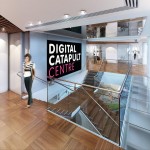 The past few years have seen numerous attempts to form clusters around particular industries and niches. The aim is undoubtedly to try and replicate the success seen in places like Silicon Valley.
The past few years have seen numerous attempts to form clusters around particular industries and niches. The aim is undoubtedly to try and replicate the success seen in places like Silicon Valley.
The UK has been particularly pronounced in its attempts to support clusters around the country. A report by KPMG last year explored the formation of clusters in Britain, and whilst it looked throughout the land, only 3 of the top 25 clusters were located outside of the south-east of England.
Earlier that year, researchers from Columbia Business School explored the benefits a start-up can glean from the cluster of companies they find themselves in. They found that their physical neighbors were of less importance than the knowledge that organizations could tap into, be that via physical or virtual means.
That isn’t stopping a number of projects forming to try and provide creative hubs for entrepreneurs however. The latest such project was opened earlier this month in the trendy King’s Cross part of London, which will also be home to the likes of Google, the British Library and the Crick Institute.
The project, called the Digital Catapult Centre, aims to help UK companies benefit from the various new technologies that will underpin the economy in the coming years. It will hopefully provide a hub for innovative digital based ideas, and act as a conduit between universities, business and other stakeholders.
Big data will be a particular focus of the centre, and in particular areas such as creating trust in the data economy and the role of data in the Internet of Things.
“When trying to address major challenges, for example the Internet of Things in healthcare, businesses reach a point where they need help to cross some ‘chasms’ on the way to bringing their products or services to market,” said CEO of the Digital Catapult Neil Crockett.
Here steps the Catapult to offer its services. As mentioned at the start of this article, creating virtual collaborations is as important, if not more so, than physical proximity, and the centre claims to be planning to facilitate that collaboration.
One such mechanism for achieving this is the pit stop. These are two week sessions whereby relevant people and expertise are brought together to try and speed up the development of a business or service.
For instance, the week commencing the 8th December will see a series of events held at the centre around the theme of digital health. This pit stop will cover topics such as digital health, wearables and health data.
In addition to yours truly, attendees will be able to get advise from partners such as University College London and The Mobile Academy. The week will be split into themes, based around things such as great design, lean start-up style methodologies, how to conduct RCTs, dealing with data, and then a day for demos.
It’s certainly an interesting approach, and I look forward to stopping by and learning more about both the approach the centre is taking, and about some of the start-ups attempting to utilize the facility.
The whole King's Cross area is incredible these days. I walked past the new research building opposite the station the other day and it looks remarkable.
It's certainly a very impressive location. The centre has a fantastic view overlooking the British Library.
Nice and all, but it's a shame that so much has to be based in London all the time.
There are some centres spread around the country I believe Mary, so not all London focused.
I often wonder how effective these kind of centres are when compared to online communities. Undoubtedly they're in a fantastic location and all that, but just being on the same street as some great names won't automatically make them collaborate with one another, will it?